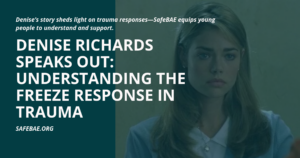Denise Richards Speaks Out: Understanding the Freeze Response in Trauma
Denise’s story sheds light on trauma responses—SafeBAE equips young people to understand and support.
Denise Richards Opens Up About Her Experience with Assault
In a heart-wrenching moment on the premiere of *Special Forces: World’s Toughest Test*, Denise Richards shared a secret she had carried for decades. At just 15 years old, the actress and mother of three was sexually assaulted. As she recounted her experience, Denise described how, in the terrifying moment, she froze—unable to scream or call for help.
For years, Denise kept this trauma buried deep, sharing it only with her husband. Speaking about it publicly for the first time, she revealed not just the pain of what happened, but also the weight of societal misconceptions around how survivors “should” react during such moments.
Her courage to share this part of her story is a powerful reminder that there is no “right” way to respond to trauma. Denise’s willingness to speak up not only honors her own healing journey but also sparks a much-needed conversation about the diverse and deeply personal ways survivors experience and process assault.
As we reflect on Denise’s story, it’s essential to explore why the “freeze” response is such a common and natural reaction to trauma. We’ll also dive into the myths surrounding survivor behavior, the importance of amplifying stories like Denise’s, and how we can collectively foster a culture of empathy and support.
Understanding the “Freeze” Response
In sharing her story, Denise Richards described an experience that many survivors know all too well: freezing in the face of danger. This reaction, though often misunderstood, is a natural and involuntary response to trauma. For survivors, it can be challenging to reconcile this instinct with societal expectations of how someone “should” respond in such moments—but it’s important to recognize that freezing is a deeply ingrained survival mechanism.
When faced with a threat, the human body activates one of three instinctive responses: fight, flight, or freeze. The freeze response, though less openly discussed, is just as valid and protective as the others. In moments where resistance or escape feels impossible, freezing allows the body to conserve energy, reduce perceived danger, and focus entirely on survival.
For survivors like Denise, the freeze response is not a reflection of weakness or failure—it is the body doing its best to protect itself. By understanding this, we can move away from harmful stereotypes and instead foster a culture of compassion and respect for the diverse ways trauma impacts individuals.
Reaching Millions, Creating Change
This year, SafeBAE’s impact has been nothing short of extraordinary. Our prevention materials alone have reached 6.2 million people, spreading knowledge about consent, healthy relationships, and bystander intervention far and wide.
Through our video content, partner collaborations, and interviews, we’ve achieved 9.4 million views—each one representing an opportunity to spark awareness and empower action. These videos don’t just educate—they inspire, offering young people and their communities tangible tools for creating safer environments.
Our Policy Reform Guides have become a vital resource for students pushing for meaningful change in their schools. With 110 guides in use, these students are driving conversations about consent and accountability in school policies, ensuring that responses to sexual violence are effective and survivor-centered.
On the ground, our in-person presentations have reached 85,000 people, delivering life-saving education and creating a ripple effect that extends beyond the room. Whether it’s a classroom, a conference, or a school assembly, these moments are where awareness becomes action, and action becomes change.
Dispelling Myths About Survivor Responses
One of the most damaging aspects of the conversation around sexual assault is the prevalence of harmful myths about how survivors “should” respond. Society often expects survivors to fight back or flee, creating a narrative that labels anything else—like freezing—as passive or weak. These misconceptions not only harm survivors but also perpetuate stigma and misunderstanding.
In reality, the freeze response is incredibly common among survivors of sexual violence. Research from the National Sexual Violence Resource Center (NSVRC) indicates that as many as 70% of survivors report freezing or feeling immobilized during their assault. This response, known as tonic immobility, is an involuntary reaction triggered by the brain’s fear response. It is not a choice or a reflection of a survivor’s strength but rather the body’s way of protecting itself under extreme stress.
These myths are further disproven by neuroscience. Studies show that the prefrontal cortex, responsible for decision-making, is often overridden during traumatic events. Survivors are not “choosing” to freeze; their bodies are doing what they’re biologically programmed to do to survive.
Instead of asking why someone didn’t fight back, we should focus on dismantling these harmful stereotypes and creating a culture of understanding. Survivors need to hear, “Your response was valid. You did what you had to do to survive.”
By embracing science and survivor stories, we can replace judgment with empathy. When we challenge these myths, we take a critical step toward supporting survivors and creating spaces where their experiences are met with compassion and respect.
Why Survivor Stories Like Denise’s Matter
When Denise Richards shared her story, she did more than recount a personal experience—she became part of a larger movement to challenge the silence and stigma surrounding sexual assault. Survivor stories like hers are vital for creating meaningful change, offering insight into the realities of trauma and inspiring a shift in how we support survivors.
By speaking out, survivors help others understand the diverse ways trauma can manifest and dispel harmful myths about what it means to experience and survive assault. Stories like Denise’s show that freezing, staying silent, or waiting years to share one’s truth are not weaknesses—they are human responses to unimaginable pain.
Research supports the power of survivor narratives. Studies show that when survivors share their experiences, it fosters empathy and reduces victim-blaming attitudes among listeners. Public figures, in particular, have a unique platform to amplify these stories, reaching audiences that might not otherwise engage with the issue.
However, it’s essential to remember that sharing one’s story is a deeply personal choice. Not every survivor wants—or needs—to disclose their experiences publicly. For those who do, their courage has the power to ripple outwards, creating spaces where others feel less alone and more empowered to seek support.
Denise’s story reminds us of the importance of centering survivors in these conversations. When we listen to and amplify their voices, we take a step closer to building a culture of understanding, empathy, and actionable change.


